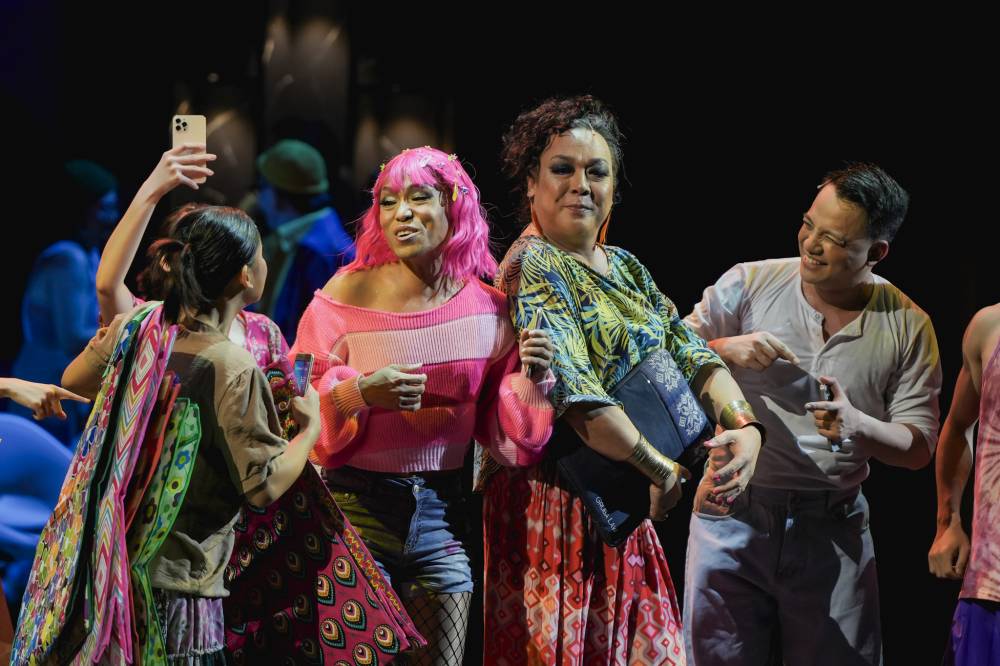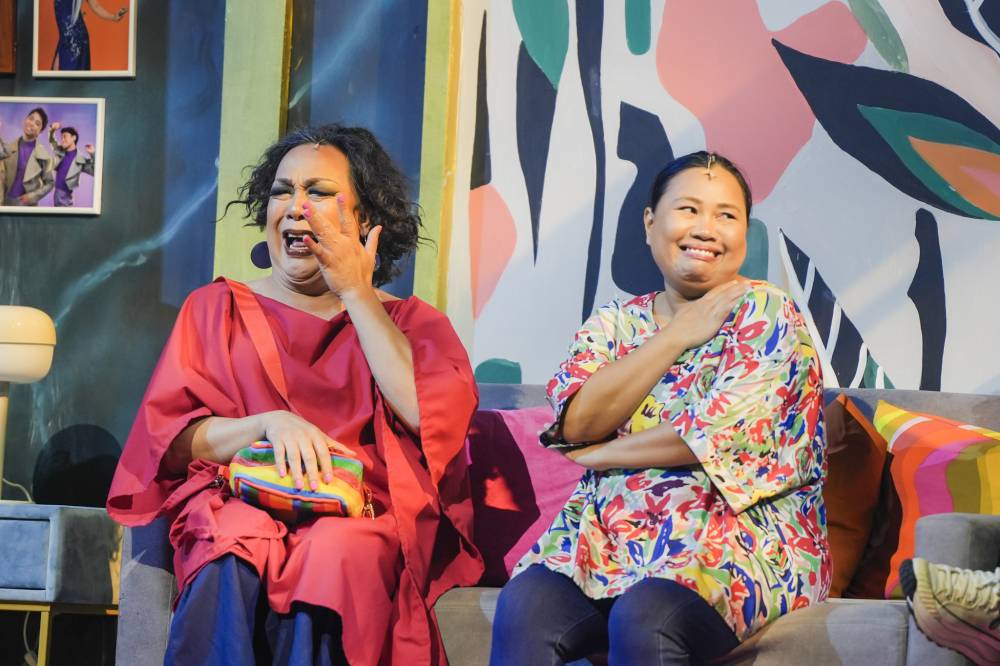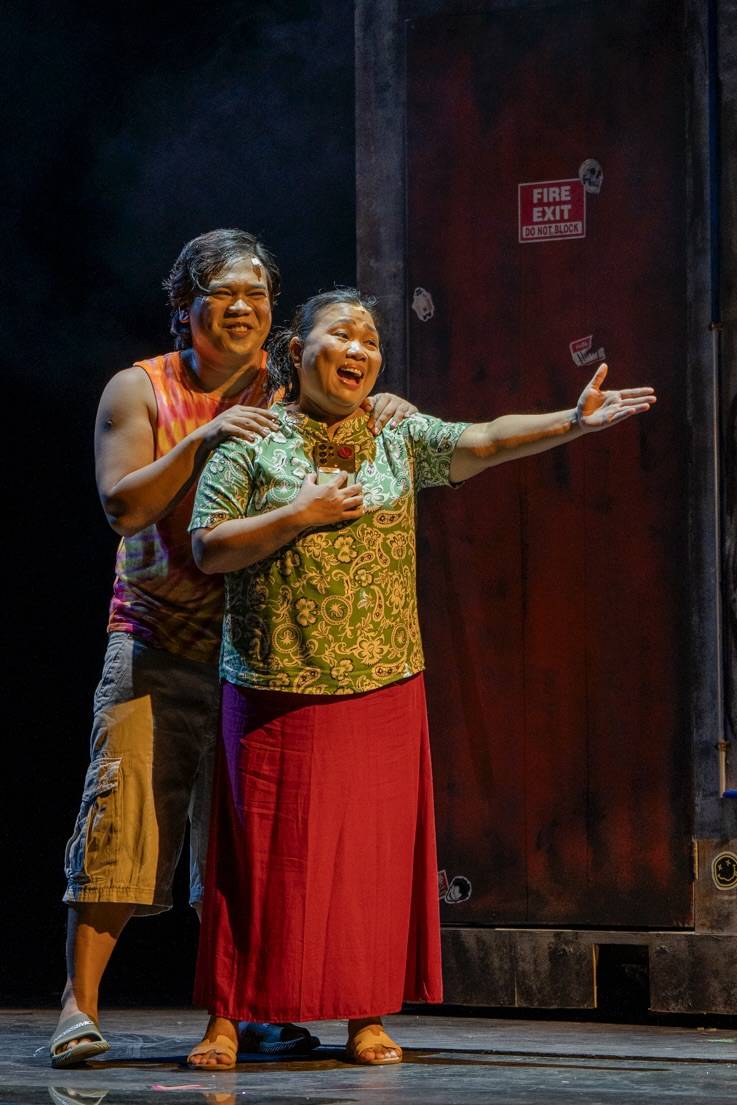‘Delia D.’ celebrates the spectacle and passion of OPM

Despite being described as a jukebox musical—that increasingly popular style of production that sets an artist’s discography to a narrative—Full House Theater Company’s “Delia D.” avoids the common pitfalls of literalizing songs or forcing them into places that don’t make sense. And it does this by drawing from the prolific, 24-year career of Jonathan Manalo (songwriter, producer, and current creative director of ABS-CBN Music) to tell a story about Filipino pop music itself.
“Delia D.” follows the titular character (played by Phi Palmos), a drag performer who enters a televised singing competition and meets fierce resistance against her talent and her legitimacy as a performer. This leads to an appropriately glamorous tour through various styles of OPM, staged and orchestrated to the nines. The show does, however, pose questions more than it provides constructive insight into what makes authentic art, but its passionate performances ensure that its emotions are always still felt.
As a musical that’s entirely about performing, its sets (designed by Lawyn Cruz) tend to be stages within stages, from Delia’s drag bar to the studio where the “Idols of the Galaxy” program is filmed. There’s a meticulous level of detail not only to how these settings look, but how they move around, piece by piece, creating depth and new windows where characters can interact—all without interrupting the flow of the story. John Batalla’s lights fully simulate the spectacle of a live television production, while video projections by GA Fallarme and Joyce Anne Garcia supplement the action via snapshots of internet commentary.

Best theater costumes
And populating the sets is the show’s large ensemble, all decked out in what could be the best theater costumes of the year, designed by Mitoy Sta. Ana. Colors pop brightly even from a distance, supporting characters are given performance outfits fitting their respective genres of music, and the drag costumes are made of suitably vibrant patchwork. Taking all these elements together, director Dexter M. Santos conducts a living, breathing stage where even the edges bustle with activity, while choreographer Stephen Viñas fills the spaces with tireless dancing. Even small interactions are accentuated by movement, expressing both solidarity and dominant assertiveness.
There is, however, a point when this much activity on stage results in the musical distracting itself from its own points. Its breakneck pace, particularly in the first act, doesn’t allow character relationships to resonate as deeply as they should. The consequences of corporate-controlled entertainment are eventually explored in the second act, but it ultimately places more of its focus on Delia’s naivety in managing fame. It all ends fairly abruptly after its climax, and can’t help but seem harsher to its own already ostracized protagonist than the systems that only give her the illusion of freedom.
Still, along the way, Dolly Dulu’s script brings up plenty to think about regarding Filipino musical artists. How much do we really take into account their personal backgrounds? Are great, established singers still worthy of support if they treat others unkindly? Where do we draw the line when it comes to a company manufacturing an artist’s image? And through all this, Dulu still validates all types of performance as creative expression—especially drag and lip syncing. Even if Delia doesn’t come from a professional vocal background, her ability to heighten a performance with costuming, dance, acting, humor, and sheer confidence is still portrayed as authentic and original.

Remarkable balance
And much of the reason why “Delia D.” works as well as it does is Palmos’ performance, which manages a remarkable balance between emotional restraint and the external projection of self-assurance. Palmos has proven throughout his theater career that he’s capable of singing the roof off a venue, but as Delia isn’t meant to be quite the same powerhouse, Palmos’ singing feels more grounded and modest, but no less impactful. In a crucial moment when the pressure grows too heavy for Delia and Manalo’s “Gusto Ko Nang Bumitaw” returns, Palmos’ tone is bitter and desperate—a striking difference from the production’s usual soaring voices.
In nearly three hours, “Delia D.” does accomplish its goal of honoring Manalo’s contributions to OPM, from Sharon Cuneta’s “May Kasama Ka” and Itchyworms’ “Kabataang Pinoy” to P-pop like Bini’s “Strings” and novelty songs like Vice Ganda’s “Boom Panes.” And the ensemble goes for broke in interpreting this score with one dizzying vocal run and belted high note after another. Palmos brings the rawness of emotion and Alfritz Blanche (as contestant Billy) supplies real soul, but it’s Shaira Opsimar’s timid rival singer Kiki whose breathtaking vocal acrobatics serve as the greatest reminder of the passion that makes Filipino pop music worth boasting about.
“Delia D.” runs until June 8 at the Newport Performing Arts Theater, Pasay City.





















